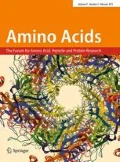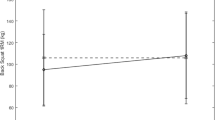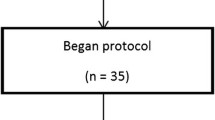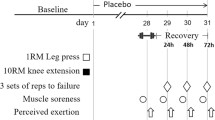Abstract
We aimed to investigate the role of betaine supplementation on muscle phosphorylcreatine (PCr) content and strength performance in untrained subjects. Additionally, we compared the ergogenic and physiological responses to betaine versus creatine supplementation. Finally, we also tested the possible additive effects of creatine and betaine supplementation. This was a double-blind, randomized, placebo-controlled study. Subjects were assigned to receive betaine (BET; 2 g/day), creatine (CR; 20 g/day), betaine plus creatine (BET + CR; 2 + 20 g/day, respectively) or placebo (PL). At baseline and after 10 days of supplementation, we assessed muscle strength and power, muscle PCr content, and body composition. The CR and BET + CR groups presented greater increase in muscle PCr content than PL (p = 0.004 and p = 0.006, respectively). PCr content was comparable between BET versus PL (p = 0.78) and CR versus BET + CR (p = 0.99). CR and BET + CR presented greater muscle power output than PL in the squat exercise following supplementation (p = 0.003 and p = 0.041, respectively). Similarly, bench press average power was significantly greater for the CR-supplemented groups. CR and BET + CR groups also showed significant pre- to post-test increase in 1-RM squat and bench press (CR: p = 0.027 and p < 0.0001; BET + CR: p = 0.03 and p < 0.0001 for upper- and lower-body assessments, respectively) No significant differences for 1-RM strength and power were observed between BET versus PL and CR versus BET + CR. Body composition did not differ between the groups. In conclusion, we reported that betaine supplementation does not augment muscle PCr content. Furthermore, we showed that betaine supplementation combined or not with creatine supplementation does not affect strength and power performance in untrained subjects.




Similar content being viewed by others
References
Balsom PD, Soderlund K, Sjodin B, Ekblom B (1995) Skeletal muscle metabolism during short duration high-intensity exercise: influence of creatine supplementation. Acta Physiol Scand 154(3):303–310
Bosco C, Belli A, Astrua M, Tihanyi J, Pozzo R, Kellis S, Tsarpela O, Foti C, Manno R, Tranquilli C (1995) A dynamometer for evaluation of dynamic muscle work. Eur J Appl Physiol Occup Physiol 70(5):379–386
Choe HS, H.L. Li, Park JH, Kang CW, Ryu KS (2010) Effect of betaine on growth hormone pulsatile secretion and serum metabolites in finishing pigs. J Anim Physiol Anim Nutr (Berl) 23(3):379–384
Craig SA (2004) Betaine in human nutrition. Am J Clin Nutr 80(3):539–549
Delgado-Reyes CV, Wallig MA, Garrow TA (2001) Immunohistochemical detection of betaine-homocysteine S-methyltransferase in human, pig, and rat liver and kidney. Arch Biochem Biophys 393(1):184–186
Goldman HI, Becklake MR (1959) Respiratory function tests; normal values at median altitudes and the prediction of normal results. Am Rev Tuberc 79(4):457–467
Green JM, McLester JR, Smith JE, Mansfield ER (2001) The effects of creatine supplementation on repeated upper- and lower-body Wingate performance. J Strength Cond Res 15(1):36–41
Greenhaff PL, Casey A, Short AH, Harris R, Soderlund K, Hultman E (1993) Influence of oral creatine supplementation of muscle torque during repeated bouts of maximal voluntary exercise in man. Clin Sci (Lond) 84(5):565–571
Gualano B, de Salles Painneli V, Roschel H, Artioli GG, Junior MN, Lucia de Sa Pinto A, Rossi da Silva ME, Cunha MR, Otaduy MC, da Costa Leite C, Ferreira JC, Pereira RM, Brum PC, Bonfa E, Lancha AHJ (2011) Creatine in Type 2 diabetes: a randomized, double-blind, placebo-controlled trial. Med Sci Sports Exerc 43:770–778
Harris RC, Soderlund K, Hultman E (1992) Elevation of creatine in resting and exercised muscle of normal subjects by creatine supplementation. Clin Sci (Lond) 83(3):367–374
Hoffman JR, Ratamess NA, Kang J, Rashti SL, Faigenbaum AD (2009) Effect of betaine supplementation on power performance and fatigue. J Int Soc Sports Nutr 6:7
Huang QC ZRX, Han XY, Li WF (2006) Effect of betaine on growth hormone pulsatile secretion and serum metabolites in finishing pigs. Livest Sci 105:78–85
Huang QC, Xu ZR, Han XY, Li WF (2007) Effect of betaine on growth hormone pulsatile secretion and serum metabolites in finishing pigs. J Anim Physiol Anim Nutr (Berl) 91(3–4):85–90
Lee EC, Maresh CM, Kraemer WJ, Yamamoto LM, Hatfield DL, Bailey BL, Armstrong LE, Volek JS, McDermott BP, Craig SA (2010) Ergogenic effects of betaine supplementation on strength and power performance. J Int Soc Sports Nutr 7:27
Lemon PW (2002) Dietary creatine supplementation and exercise performance: why inconsistent results? Can J Appl Physiol 27(6):663–681
Maresh CM, Farrell MJ, Kraemer WJ, Yamamoto LM, Lee EC, Armstrong LE, Hatfield DL, Sokmen B, Diaz JC, Speiring BA, Anderson JA, Volek JS (2008) The effects of betaine supplementation on strength and power performance. Med Sci Sports Exerc 39:S101
Nicastro H, Gualano B, de Moraes WM, de Salles PV, da Luz CR, dos Santos CA, de Salvi GF, Medeiros A, Brum PC, Lancha AHJ (2011) Effects of creatine supplementation on muscle wasting and glucose homeostasis in rats treated with dexamethasone. Amino Acids (in press)
Sewell DA, Harris RC (2002) Effect of creatine supplementation in the thoroughbred horse. Equine Vet J 18:239–242
Siri WE (1993) Body composition from fluid spaces and density: analysis of methods 1961. Nutrition 9(5):480–491 (discussion 480, 492)
Storch KJ, Wagner DA, Young VR (1991) Methionine kinetics in adult men: effects of dietary betaine on L-[2H3-methyl-1–13C]methionine. Am J Clin Nutr 54(2):386–394
Tarnopolsky MA, Bourgeois JM, Snow R, Keys S, Roy BD, Kwiecien JM, Turnbull J (2003) Histological assessment of intermediate- and long-term creatine monohydrate supplementation in mice and rats. Am J Physiol Regul Integr Comp Physiol 285(4):R762–R769
Wilmore JH, Behnke AR (1969) An anthropometric estimation of body density and lean body weight in young men. J Appl Physiol 27(1):25–31
Wise CK, Cooney CA, Ali SF, Poirier LA (1997) Measuring S-adenosylmethionine in whole blood, red blood cells and cultured cells using a fast preparation method and high-performance liquid chromatography. J Chromatogr B Biomed Sci Appl 696(1):145–152
Zhan XA, Li JX, Xu ZR, Zhao RQ (2006) Effects of methionine and betaine supplementation on growth performance, carcase composition and metabolism of lipids in male broilers. Br Poult Sci 47(5):576–580
Acknowledgments
We would like to thank Ethika® for providing the nutritional supplements. Hamilton Roschel and Serena del Favero were supported by Fundação de Amparo à Pesquisa do Estado de São Paulo–FAPESP (2010/51428-2 for HR). The authors declare that they do not have conflict of interests.
Author information
Authors and Affiliations
Corresponding author
Rights and permissions
About this article
Cite this article
del Favero, S., Roschel, H., Artioli, G. et al. Creatine but not betaine supplementation increases muscle phosphorylcreatine content and strength performance. Amino Acids 42, 2299–2305 (2012). https://doi.org/10.1007/s00726-011-0972-5
Received:
Accepted:
Published:
Issue Date:
DOI: https://doi.org/10.1007/s00726-011-0972-5




